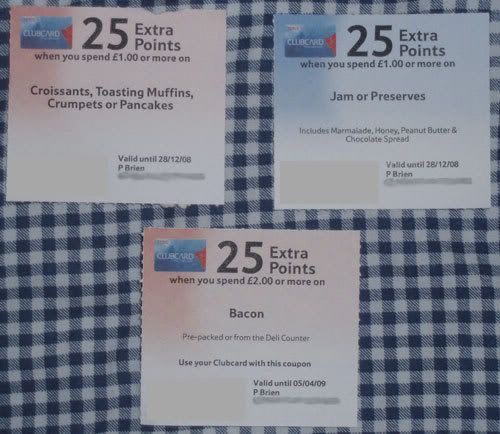In our modern technologically-connected world — of which you're seeing evidence right now, seeing as this content is being delivered to you from Google's servers in LA, despite the fact that I wrote it in a flat in Enfield — information is the new currency. That's really not much of an exaggeration. Especially now that the economy is imploding spectacularly, any edge that a company can get over its rivals is going to be ruthlessly exploited. And if they can dress up such an edge as actually being for the benefit of their customers, all the better.
Supermarket loyalty cards are a great example. These schemes started off as something of a white elephant for the supermarkets — although they're a big draw for customers, they cost a lot to keep going and probably offer little tangible benefit to the retailer (anyone who shops in a particular place often enough to want a loyalty card is unlikely to be regularly shopping elsewhere anyway) — but once one of them started offering the scheme, everyone else jumped on board in an attempt not to get left behind. That means that supermarkets have desperately floundered to make money out of it ever since, and one of the ways they can do that is to use the information they gather.
Consider what information the supermarket has about you. If they know everything that you buy in their shops, they can estimate the size and composition of your family, your average alcohol consumption, your waistline (those pizzas add up), your social schedule (so how often are you buying multi-packs of Doritos?) and your general economic situation. And that means that they can, in theory, target their marketing very accurately. For example, if they work out that, statistically speaking, it's a likely week for you to buy ice-cream, they can draw your attention to the special offers they have on the expensive brands. If you haven't bought chocolate in the last three weeks, they might push Weight Watchers products.
We almost certainly will never see the exact information held about us, although I suppose a Data Protection Act request might be interesting. There's one time when you get to see the conclusions drawn by the supermarket very clearly, though, and that's when they send you money-off vouchers. This is the most precise form of marketing that they can produce, so it'll always be the most information-rich time in your relationship with your local retailer.
Obviously, I find this concept slightly creepy, but at the same time I'm an absolute sucker for finding out interesting stuff about myself. That's why I like last.fm, despite it having almost no practical use — being able to point to a summary ofeverything I've ever listened to when connected to their service is kind of fun, and tells me a lot about my music taste. So I had a rather enjoyable little moment the other week, when I found some of the coupons Tesco had sent me in the past few months. Boy, do they know me.
Boy, do they know me.
Tuesday, 3 March 2009
Doughnuts are not included. De-boost.
Posted at
11:24 pm
![]()
Tags: food, technology




1 comment:
I'm always proud when I get the 'fruit' and 'vegetables' ones. And I always get 'bread' and 'cheese' as well. I'm a simple lad.
p.s. how often do you buy jam?? Surely a jar lasts three months or so?
Post a Comment